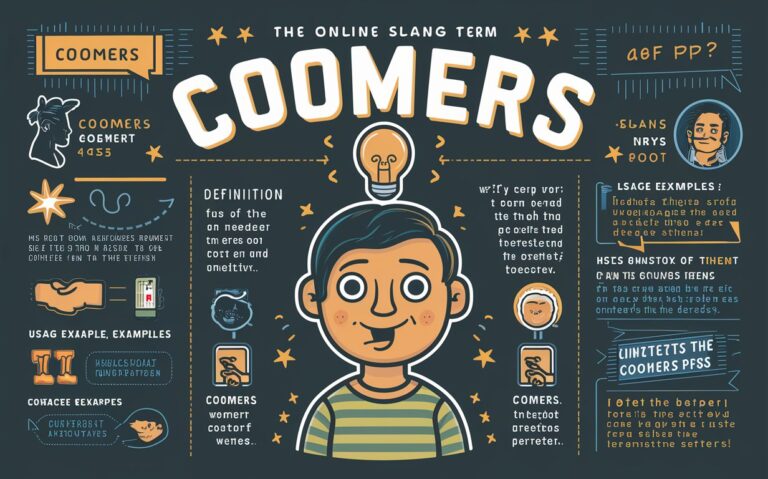Introduction
The internet is filled with slang terms and cultural shorthand that often confuse newcomers and even seasoned users. Among these evolving digital expressions is the term “coomers”, which emerged from online meme culture and quickly spread across forums, social media, and digital communities. While it began as a tongue-in-cheek reference within specific subcultures, its usage has broadened, sparking debates about humor, lifestyle habits, and the internet’s power to shape language. To better understand coomers, it’s important to unpack its origin, what it represents, how it became popular, and why it continues to circulate in today’s conversations.
What Does the Term “Coomers” Mean?
At its simplest, the word “coomer” is an internet slang term that typically refers to someone who is excessively preoccupied with adult entertainment or digital gratification. The label is often used humorously or sarcastically, but it can also carry a critical tone depending on the context. The term originated from an exaggerated cartoon meme character, often portrayed with tired eyes and messy features, symbolizing compulsive online habits. Over time, “coomer” evolved beyond its narrow origin and is now used more broadly to describe individuals who are overly consumed by online indulgences, whether in media, gaming, or digital distractions.
The Origin of the Coomers Meme
The concept of the “Coomer” meme first appeared in imageboards and online communities around 2019. The illustration of the “Coomer” character was drawn in the same style as other popular meme templates such as “Doomer” and “Zoomer.” The exaggerated artwork became instantly recognizable and spread rapidly, particularly across communities that frequently discussed internet culture, habits, and relationships with technology. Initially, it was a niche meme with limited reach, but as platforms like Reddit, Twitter, and TikTok amplified it, the term “coomer” quickly embedded itself into mainstream meme language.
Coomers in Internet Culture
As the internet became the primary source of entertainment, the term “coomer” gained traction as a way of poking fun at modern digital lifestyles. Beyond its initial focus on adult content, people began using it to highlight excessive behaviors tied to online consumption—whether it was endlessly binge-watching shows, spending late nights on gaming platforms, or scrolling endlessly through social feeds. The humor comes from exaggerating human tendencies in the digital age, while also pointing to genuine concerns about dependency and balance. For many, calling someone a “coomer” is a form of internet satire, but for others, it represents a real critique of digital overindulgence.
Why the Term Still Matters in 2025
Even though meme cycles are usually short-lived, “coomers” has managed to stay relevant because it reflects ongoing realities of digital behavior. In 2025, with the rise of AI-generated content, VR entertainment, and constant access to on-demand streaming, discussions around overconsumption are more relevant than ever. The term resonates not just because of humor, but because it symbolizes how people struggle to balance entertainment with productivity, social connections, and mental well-being. In this way, the word “coomer” continues to serve both as a cultural joke and as a commentary on modern digital life.
The Broader Implications of the Coomers Meme
Language on the internet often evolves from humor into cultural critique, and “coomers” is no exception. While some see it as a harmless joke, others interpret it as a reflection of how digital addictions can affect mental health, relationships, and lifestyle habits. It also raises questions about how quickly memes normalize sensitive topics and how online communities shape public conversations about personal behavior. Like many internet terms, it blurs the line between humor and criticism, making it both a meme and a mirror of society’s struggles in the digital age.
Conclusion
The term “coomers” is more than just a passing meme—it is a symbol of how the internet encapsulates humor, exaggeration, and cultural reflection all at once. From its humble beginnings as a crude drawing on forums to its widespread use across mainstream platforms, the concept has transformed into a versatile word used for both comedy and commentary. In 2025, coomers remains relevant because it captures the essence of digital overindulgence, a challenge almost everyone faces in a hyper-connected world. While it will likely continue to evolve, one thing is certain: coomers has secured its place in the ever-changing dictionary of internet slang.
❓ Frequently Asked Questions (FAQ)
Q1: What does “coomers” mean?
The term refers to someone portrayed as overly obsessed with online adult entertainment or other forms of excessive digital indulgence. It originated from a meme character.
Q2: Where did the word “coomers” come from?
It began as an internet meme around 2019, created in the same cartoon style as other popular meme characters like “doomers” and “zoomers.”
Q3: Is the term “coomers” offensive?
It can be, depending on context. Sometimes it’s used jokingly among friends, but in other cases, it may be interpreted as critical or derogatory.
Q4: Why is “coomers” still used today?
The term remains popular because it reflects modern digital habits, especially in the age of streaming, gaming, and constant online access.
Q5: Is “coomers” just about adult content?
Not entirely. While it started with that association, its meaning has broadened to describe anyone excessively engaged in online entertainment or habits.
